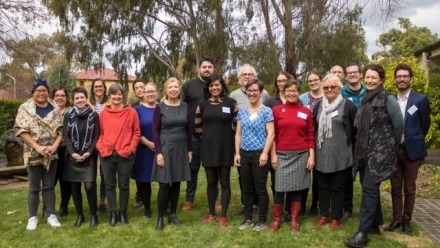Developing new methodologies for researching and recounting histories that reckon with the long duration of Indigenous life on, in, and of this land is at the heart of the ARC Laureate Project Rediscovering the Deep Human Past. The field of Indigenous histories has long been at the forefront of disciplinary shifts and challenges, both through embracing diverse archives and appreciating them from and in relation to Indigenous perspectives, of overturning older understandings of history. These practices have produced rich possibilities for historical transformation. From commitments to decolonisation, to practicing history in the field, to engaging seriously with Indigenous knowledges, the field has been characterised by multidisciplinary research practice which, at its best, engages creatively without appropriating unquestionable authority over Indigenous pasts.
We facilitated the first Kathleen Fitzpatrick Workshop of the ARC Laureate Program, at University House at the ANU on 26 September, to provide an opportunity to think about and work on some of these new methodologies in Indigenous histories. We brought together some established researchers with about twenty promising early career scholars who are doing innovative work in Indigenous histories; some working with a long duration, some with unconventional sources, some with unexpected connections and places. After welcomes and introductions from Professor Ann McGrath and Dr Ben Silverstein, we discussed methodological possibilities, as well problems and blockages, in new research being carried out across the field.
Ann McGrath introduced the problem of carrying out research into deep time history, inviting the delegates to be part of the journey into new research methods that were collaborative, risky, transdisciplinary, and multivocal, and which seek urgently to widen the scale and scope of Australian history. Dr Laurie Bamblett led a discussion on methods of questioning and learning in Aboriginal communities, considering ways of approaching people ethically and responsibly, and of carrying out research that was faithful to their expectations and understandings. Dr Maria Nugent turned our attention from the process of gathering stories to that of working with them, engaging the difficult responsibilities of the historian in engaging with archives and oral histories. And finally, Professor Jaky Troy discussed the ways of working with archives in projects of language revival and resurgence, along with Mujahid Torwali who spoke on his work revitalising the Torwali language of Pakistan.
In the concluding discussion we returned to the problems of searching for, and our responsibility to, truth. This was a question that had recurred throughout the day, along with the matter of how historians might engage with the varied histories and history-making practices of Aboriginal people that often challenge the way the disciplines have represented the Australian past. These questions remain unresolved, providing us with much to consider and work on over the life of the Laureate project. We’re looking forward to further collaborations with the many talented researchers who attended the day.


